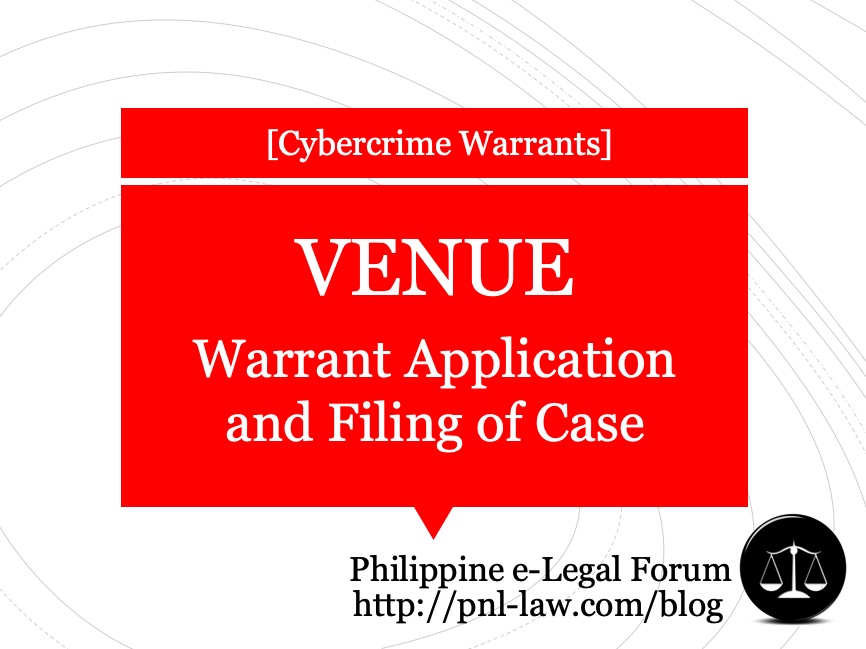The Rule on Cybercrime Warrants provides the procedure for the application and grant of warrants and related orders involving the preservation, disclosure, interception, search, seizure, and/or examination, as well as the custody, and destruction of computer data, as provided under the Cybercrime Prevention Act of 2012 (Republic Act No. 10175).

The Rule on Cybercrime Warrants makes a distinction between cybercrime offenses defined and penalized under the Cybercrime Prevention Act of 2012, and offenses defined in other laws but committed by, through and with the use of information and communications technology (ICT).
I. VENUE FOR APPLICATION/ISSUANCE OF WARRANTS
Before issuing a warrant, the judge must personally examine in the form of searching questions and answers, in writing and under oath, the applicant and the witnesses he may produce, on facts personally known to them and attach to the record their sworn statements, together with the judicial affidavits submitted. There are designated Cybercrime Courts throughout the Philippines.
A. Offenses under RA 10175
An application for a warrant under this Rule concerning a violation of Section 4 (Cybercrime Offenses) and/or Section 5 (Other Offenses) of RA 10175 shall be filed by the law enforcement authorities before any of the designated cybercrime courts in the following jurisdictions:
(i) Warrants enforceable nationwide and outside the Philippines:
- 1. Quezon City
- 2 Manila City
- 3. Makati City
- 4. Pasig City
- 5. Cebu City
- 6. Iloilo City
- 7. Davao City
- 8. Cagayan De Oro City
(ii) Warrants enforceable only in a particular judicial region, in the province or the city where the offense or any of its elements:
- 1. has been committed, is being committed or is about to be committed, or
- 2. where any part of the computer system used is situated, or
- 3. where any of the damage caused to a natural or juridical person took place
B. Offenses under other laws
An application for a warrant for all crimes defined and penalized by the Revised Penal Code, as amended, and other special laws, if committed by, through, and with the use of ICT, shall be filed by the law enforcement authorities with the regular or other specialized regional trial courts, as the case may be, within its territorial jurisdiction in the places above-described.
II. VENUE OF CRIMINAL ACTIONS
The Rule on Cybercrime Warrants supplements the existing Rules of Criminal Procedure, which provisions shall continue to govern the preliminary investigation and all stages of prosecution of criminal actions involving violations of RA 10175, including all crimes defined and penalized by the Revised Penal Code, as amended, and special laws, committed by, through, and with the use of information and communications technologies.
A. Offenses under RA 10175
The criminal actions for violation of Section 4 (Cybercrime offenses) and/or Section 5 (Other offenses) of RA 10175, shall be filed before the designated cybercrime court of the province or city:
- 1. where the offense or any of its elements is committed, or
- where any part of the computer system used is situated, or
- where any of the damage caused to a natural or juridical person took place
The court where the criminal action is first filed shall acquire jurisdiction to the exclusion of the other courts.
B. Offenses under other laws
All other crimes defined and penalized by the Revised Penal Code, as amended, and other special laws, committed by, through, and with the use of ICT shall be filed before the regular or other specialized regional trial courts, as the case may be.
III. INCIDENTAL MATTERS
Once a criminal action is instituted, a motion to quash and other incidents that relate to the warrant shall be heard and resolved by the court that subsequently acquired jurisdiction over the criminal action. The prosecution has the duty to move for the transmittal of the records, as well as the transfer of the items’ custody to the latter court. [See Custody of Computer Data]
IV. DUTY OF PROSECUTOR
Once a criminal action is instituted, it shall be the duty of the prosecutor, or his/her duly authorized representatives, to move for the immediate transmittal of the records as well as the transfer of the intercepted, disclosed, searched, seized and/or examined computer data and items, including the complete and verified inventory thereof, to the court that subsequently acquired jurisdiction over the criminal action. The motion for the purpose shall be filed before the court that issued the warrant and has custody of the computer data within 10 days from the time the criminal action is instituted and shall be acted upon by the court within a period of 5 days.
- Extension of Filing Periods and Suspension of Hearings for March 29 to April 4, 2021: SC Administrative Circular No. 14-2021 (Full Text) - March 28, 2021
- ECQ Bubble for NCR, Bulacan, Cavite, Laguna and Rizal: Resolution No. 106-A (Full Text) - March 27, 2021
- Guidelines on the Administration of COVID-19 Vaccines in the Workplaces (Labor Advisory No. 3) - March 12, 2021
